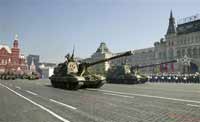What’s wrong with Victory Day parade in Moscow?
An average Russian human rights activist has a very hard fate. The society does not understand him, he defends abstract rights, and he is devoid of the Western grants and is never invited to appear in TV programs. However, some of them contrive to break the information blockade. For instance, human rights activists Lev Ponomaryov and Arseny Roginsky engaged into a controversy with Vladimir Putin on Tuesday. Nevertheless, it did no good to them both.

Lev Ponomaryov, the leader of the For Human Rights group, described the Victory Day military parade on May 9 as “muscle flexing.”
“I think that military vehicles at the parade are unnecessary for the country that tries to show its peaceful course of development,” he said. “Military vehicles at the parade show that we are flexing muscles and posing threat to the rest of the world. Whom do we try to show our power to? Georgia?” he added.
His attitude was shared by Arseny Roginsky, the chairman of the International Memorial Society.
“This is a symbolic act aimed to demonstrate our ‘muscles’ to the entire world and our citizens and prove that we are strong and extremely powerful. It is an artificial attempt to revive the Soviet myth that if they fear, they respect,” he said.
Also see: Tanks and rocket systems roll across Moscow's Red Square
Vladimir Putin himself gave a reply to the human rights activists. At the meeting with Russia’s government ministers Tuesday he stated that Russia does not try to threaten anybody with military parades. “Throughout many years it’s the first time when military vehicles will be involved in the parade. This is no saber-rattling. It is the demonstration of our growing defense abilities. We do not threaten anyone, and we are not going to. We do not impose anything on anybody. We possess everything in abundance. We are able to protect our people, our citizens, our state, our riches which our country abounds in,” Putin stated.
The addressee of the message is obvious. Government members are unlikely to doubt about the objectives and sense of the military parade to commemorate Victory Day. You need to have the alternative and human rights style of thinking to see the aggressiveness of the foreign policy in the military ceremony of Russia’ major holiday and at the same time not to see obvious things – thousands of Muscovites crowd along Tverskaya Street during every rehearsal of the Victory parade.
“I don’t think the demonstration of military vehicles can be meaningful either in Russia, or in any other country,” Ponomaryov said. “If it stimulated the development of our armed forces, I would support it. But these parades distract the armed forces from their normal daily work”.
The human rights activist does not understand (or pretends not to understand) that a military parade does stimulate the development of the armed forces, while ignoring the army does not raise its prestige and does not help to solve any problems.
However, this logic and these questions are typical of those who were not so long ago called “demschiza” (democratic schizophrenics). Valeria Novodvorskaya gave an interview to Gazeta on the eve of Victory Day in 2007: “I never celebrate May 9 and I do not recommend anybody to do it…if forward-looking mankind wants to celebrate something, it does it meekly and without fuss. Such grandiose parades like in Russia are organized by losers who lost the rest and who need a myth that they are worth something.”
It is quite clear that it is not parades, but the holiday itself that invokes acute idiosyncrasy in them. On the eve of the 60th anniversary of the Victory in WWII, Alexander Minkin wrote in Moskovski Komsomolets: “Maybe, it would have been better if Nazi Germany had conquered the USSR in 1945, or even in 1941. In this case we would not have lost 22 or 30 million people. I don’t count Stalin’s millions of victims”.
A host of Echo of Moscow radio station, Buntman, described May 9 as “a corporate party of the Russian Federation Closed Joint-Stock Company.” “Throughout several years this holiday reminds of a corporate party,” he said about Victory Day. “This time military vehicles are involved to encourage the corporate spirit. These military vehicles rattle along Moscow streets, the traffic is blocked, and the fate of asphalt roads is quite obscure.”
Do you think that Buntman is greatly concerned with the fate of Moscow asphalt roads? He is more likely to be concerned with Victory Day. So is Ponomaryov, Roginsky, Novodvorskaya, Minkin and others, for “forward-looking mankind” “never celebrates May 9”. A parade with military vehicles on Red Square damages the Army and roads. On the whole, a Victory parade is for “losers”. “Demschiza” has other values.
“We cannot ban a gay parade,” Valeria Novodvorskaya stated. A hemp march and a gay parade should be allowed, Lev Ponomaryov believes. “People of democratic views and high civic engagement will always summon the courage to back up dissidents, including proponents of legalized cannabis and gay parades”.
“Gay parades are a way of showing your individuality, and for example, in Berlin there is no such segregation,” Butman said. “I look at Berlin and Paris. The mayor of Paris is gay, but nobody has problems with it.”
Dmitry Lyskov
Pravda.ru
AP photos
Translated by Julia Bulygina
Subscribe to Pravda.Ru Telegram channel, Facebook, RSS!


